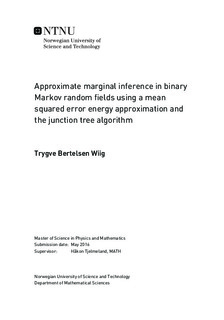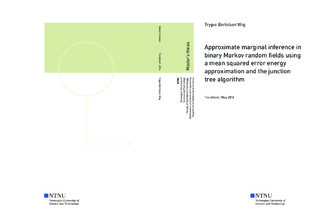| dc.description.abstract | In this thesis, we use a mean squared error energy approximation for edge deletion in order to make performing inference in Markov random fields using the junction tree algorithm tractable, and by that develop an approximate marginal inference algorithm for binary Markov random fields. We apply the algorithm to a wide range of example models, including pairwise Ising models and Boltzmann machines, as well as two types of higher-order grid models. Three different approaches to selecting edges for deletion are developed and compared, and the quality of approximation of our algorithm is compared to that of the loopy belief propagation algorithm as well as to Gibbs sampling based inference, two traditional approaches to performing approximate marginal inference.
The results of the numerical experiments we have performed indicate that traditional approaches to approximate inference usually give superior results to those from our algorithm when working with pairwise models. However, the algorithm developed in this thesis shows promise when applied to higher-order models, and in cases where loopy belief propagation does not converge and stochastic methods are undesirable. We also find that choosing edges to delete using the Kullback-Leibler divergence as a criterion is particularly effective, but that other edge selection methods may be as effective for certain types of models. | |

